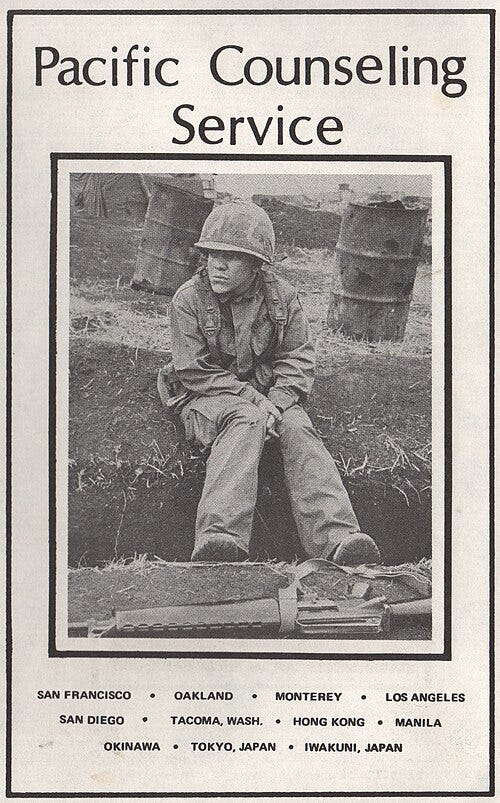From Liberation to Laundering
When Movements Become Assets for Dictators and Genocide
Today’s digital-era activism is uniquely vulnerable to real-time capture and redirection by authoritarian regimes. The “global liberation” script that PCS admired is now easily co-opted, funded, and weaponised by states with their own agendas.
History Echoes, But the Tune Has Changed
In the heat of the Vietnam War, the Pacific Counseling Service (PCS) became a legend among antiwar organizers. What began as legal advice for GIs evolved into a network of GI coffeehouses, radical pamphlets, and international solidarity. Inspired by Third World liberation—yes, including Maoist China—PCS believed in building alliances with the oppressed, linking the struggle of Black, brown, and Asian GIs to anti-colonial fights abroad.
But here’s the twist:
Despite all the government paranoia and congressional hearings, there’s no credible evidence that PCS was ever run, funded, or directed by China. Its anti-imperial politics were authentic, locally organised, and never functioned as an actual “foreign asset.” PCS might have admired the Vietnamese or Chinese revolutions, but their operations remained independent—rooted in the lived reality of American GIs and Asian leftists fighting for liberation.
The Modern Era: Palestine Action, Unity of Fields, and the Multipolar Trap
Fast forward to today. Movements like Palestine Action and Unity of Fields pick up the radical mantle—opposing imperial wars, championing direct action, building international solidarity. But the battlefield has changed.
Funding and Influence:
Instead of passing the hat at a GI coffeehouse, these networks often rely on shadowy benefactors like Fergie Chambers—a self-described “communist trust fund baby” who’s openly pro-Russia, pro-Hamas, and has ties to Russian-occupied Donbas.
The money isn’t just clean left-wing activism. It’s tangled up with global information warfare.Narrative Laundering:
Every protest, every bit of direct action, is instantly weaponised by Russian and Iranian media. RT, Sputnik, and PressTV don’t just report—they amplify, frame, and redeploy these events to suit Moscow’s or Tehran’s strategic objectives.
This isn’t theoretical: from legal funds to viral memes, today’s activism is regularly channeled into Kremlin or IRGC talking points.Movement Capture:
The state doesn’t need to run a movement, only to steer, fund, or reframe it just enough. Digital activism’s openness and decentralisation—its greatest strengths—are now entry points for hostile influence.
What’s the Real Risk?
When PCS “went global,” it was about cross-pollinating grassroots resistance, not laundering narratives for a foreign intelligence service. Today’s digital movements can find themselves—sometimes unwittingly—becoming amplifiers or even assets for authoritarian regimes whose endgame is chaos, not liberation.
The PCS model was hard to hijack: local, face-to-face, accountable, and transparent.
Palestine Action and its kin operate at internet speed—meaning every slogan, every arrest, every act can be clipped, packaged, and re-broadcast for purposes far beyond their intent.
The Lesson for Modern Activism
Movements that fail to police their funding, alliances, and information flows risk more than just infiltration—they risk becoming the very thing they claim to fight. The tools of liberation can, and will, be turned against them.
PCS, for all its radicalism, kept its autonomy. That’s why it’s remembered as a genuine force for justice, not as a pawn in a great power game.



